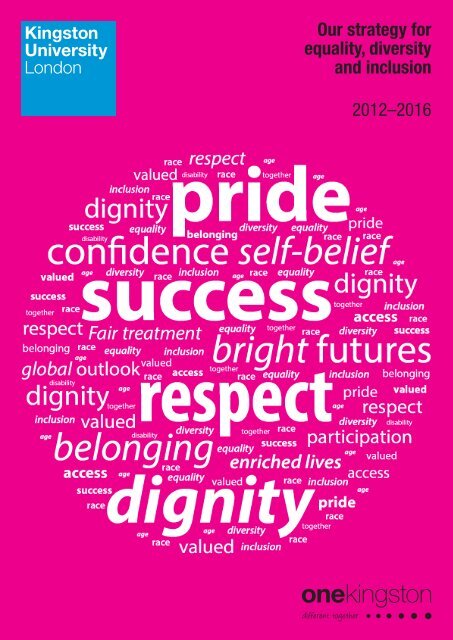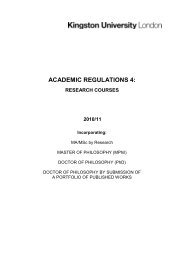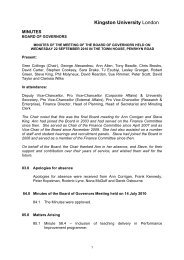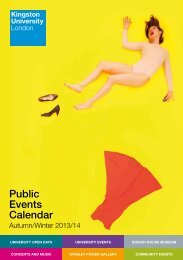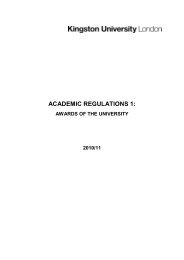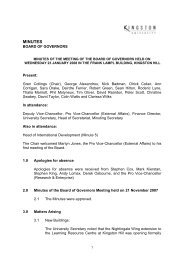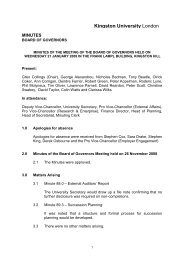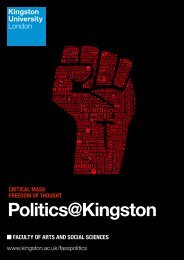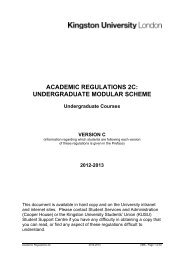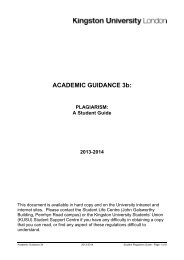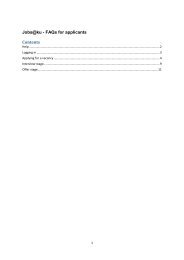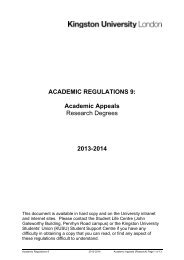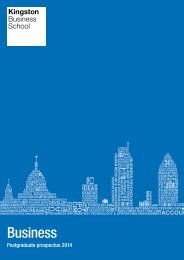One Kingston our strategy for equality, diversity and inclusion
One Kingston our strategy for equality, diversity and inclusion
One Kingston our strategy for equality, diversity and inclusion
Create successful ePaper yourself
Turn your PDF publications into a flip-book with our unique Google optimized e-Paper software.
Our <strong>strategy</strong> <strong>for</strong><br />
<strong>equality</strong>, <strong>diversity</strong><br />
<strong>and</strong> <strong>inclusion</strong><br />
2012–2016
Our statement of commitment to <strong>equality</strong>,<br />
<strong>diversity</strong> <strong>and</strong> <strong>inclusion</strong><br />
<strong>Kingston</strong> University values <strong>diversity</strong> highly, challenges in<strong>equality</strong> <strong>and</strong> takes<br />
active steps to provide an inclusive environment <strong>for</strong> <strong>our</strong> students, staff <strong>and</strong><br />
visitors irrespective of their age, disability, gender re-assignment, marriage<br />
or civil partnership, pregnancy or maternity, race, religion or belief or sexual<br />
orientation.<br />
We value <strong>diversity</strong> highly; recognising that different people bring different ideas,<br />
histories, knowledge <strong>and</strong> culture <strong>and</strong> that this difference brings great strength<br />
which improves the quality of the University’s work.<br />
We challenge in<strong>equality</strong>; underst<strong>and</strong>ing that patterns of in<strong>equality</strong> in society <strong>and</strong><br />
higher education are also reflected at the University <strong>and</strong> that difference in outcomes<br />
<strong>for</strong> <strong>our</strong> students <strong>and</strong> staff should be challenged by all of us <strong>and</strong> addressed through<br />
a multiple of strategies including lawful positive action.<br />
We ensure an inclusive environment; knowing <strong>our</strong> staff, students <strong>and</strong> visitors<br />
will want to study, work <strong>and</strong> visit with us if we respect the rights of individuals <strong>and</strong><br />
groups to hold their own views <strong>and</strong> values, but will not tolerate these to<br />
be presented in a way that intimidates, degrades or is hostile to others.<br />
Julius Weinberg<br />
Vice-Chancellor<br />
Fiona Ross<br />
Chair of the Equality Committee,<br />
Dean of the Faculty of Health,<br />
Social Care Sciences & Education<br />
David Mackintosh<br />
Deputy Vice-Chancellor
Equality, Diversity <strong>and</strong> Inclusion Strategy<br />
2012 – 2016<br />
GOAL 1 To create an inclusive approach to recruitment <strong>and</strong> the<br />
student experience which promotes <strong>diversity</strong> <strong>and</strong> enables<br />
all <strong>our</strong> students to fl<strong>our</strong>ish; leaving with the best possible<br />
outcomes <strong>and</strong> with the knowledge <strong>and</strong> skills to make<br />
choices about fulfilling careers.<br />
OBJECTIVE 1.1<br />
Ensure <strong>our</strong> recruitment <strong>and</strong> admissions strategies are<br />
in<strong>for</strong>med by <strong>diversity</strong> data.<br />
relating to <strong>diversity</strong> continue to be reflected in<br />
Action 1: Underst<strong>and</strong> the impact of internal student recruitment <strong>and</strong> admissions.<br />
<strong>and</strong> external changes (eg admissions criteria, Action 3: Adapt/deliver widening participation<br />
Led by Learning, fees) on the <strong>diversity</strong> of <strong>and</strong> outreach activity to enc<strong>our</strong>age<br />
student admissions.<br />
applications from under-represented <strong>and</strong><br />
Action 2: Develop <strong>and</strong> deliver an action plan diverse groups.<br />
which ensures the values of Led by Learning<br />
OBJECTIVE 1.2<br />
Create an inclusive cross learning partnership between staff<br />
<strong>and</strong> students that reflects the <strong>diversity</strong> of <strong>our</strong> community.<br />
Action 1: Review the existing curriculum to<br />
co-create an inclusive learning experience,<br />
drawing on the knowledge, international<br />
perspective <strong>and</strong> cultural capital of <strong>our</strong> diverse<br />
students <strong>and</strong> staff.<br />
OBJECTIVE 1.3<br />
Create <strong>and</strong> maintain an inclusive academic framework<br />
<strong>and</strong> student support service that benefits all students.<br />
Action 1: Integrate <strong>equality</strong>, <strong>diversity</strong> <strong>and</strong><br />
<strong>inclusion</strong> in the curriculum so students are<br />
able to acquire the knowledge <strong>and</strong> skills to<br />
work in a diverse <strong>and</strong> global environment.<br />
Action 2: Evaluate (through validation panels,<br />
c<strong>our</strong>se monitoring <strong>and</strong> Internal Subject<br />
Reviews) how effectively we have developed<br />
an inclusive curriculum across the University.<br />
Action 3: Ensure Personal Tutors are<br />
equipped with the knowledge <strong>and</strong> skills to<br />
support the differing needs of their diverse<br />
student body.<br />
Action 2: Provide internal staff development<br />
programmes in inclusive curriculum <strong>and</strong><br />
learning partnerships.<br />
Action 4: Connect all mentoring <strong>and</strong><br />
employability opportunities available to<br />
students who are less likely to gain graduate<br />
level employment <strong>and</strong> publicise this creatively<br />
<strong>for</strong> maximum impact.<br />
Action 5: Deliver the Access Agreement actions<br />
plans to reduce differentials in recruitment,<br />
retention, attainment <strong>and</strong> employment.<br />
Action 6: Investigate the postgraduate<br />
student experience <strong>and</strong> develop an action<br />
plan to address differentials in recruitment<br />
<strong>and</strong> outcomes.<br />
1
GOAL 2 To ensure an inclusive approach to recruitment <strong>and</strong> the<br />
staff experience which promotes <strong>diversity</strong> <strong>and</strong> enables all<br />
<strong>our</strong> staff to have opportunities to take part in continuous<br />
professional development so that they are able to achieve<br />
the highest level of professionalism <strong>for</strong> the benefit of <strong>our</strong><br />
diverse students, staff <strong>and</strong> community.<br />
OBJECTIVE 2.1<br />
Implement inclusive People <strong>and</strong> Research Strategies that delivers the right skills,<br />
demographics <strong>and</strong> opportunities required to achieve Led by Learning.<br />
Action 1: Ensure recruitment <strong>and</strong> selection is<br />
in<strong>for</strong>med by <strong>diversity</strong> data.<br />
Action 2: Support the implementation of<br />
the <strong>equality</strong>, <strong>diversity</strong> <strong>and</strong> <strong>inclusion</strong> related<br />
values that <strong>for</strong>m part of the UK Professional<br />
St<strong>and</strong>ards Framework.<br />
Action 3: Ensure the Academic Promotion<br />
<strong>and</strong> Progression procedure is designed <strong>and</strong><br />
delivered to include all excellent staff.<br />
Action 4: Ensure that line managers<br />
implement an inclusive appraisal scheme that<br />
maximises the contribution of all <strong>our</strong> staff.<br />
Action 5: Develop <strong>and</strong> evaluate a ‘Preparing<br />
<strong>for</strong> Grade 10 framework’ as part of the<br />
approach to achieve the <strong>equality</strong> objectives.<br />
Action 6: Increase staff underst<strong>and</strong>ing<br />
of strategic <strong>and</strong> local aspects of <strong>equality</strong>,<br />
<strong>diversity</strong> <strong>and</strong> <strong>inclusion</strong>.<br />
Action 7: Create <strong>and</strong> maintain an inclusive<br />
research environment that benefits all staff.<br />
2<br />
Our new Equality, Diversity <strong>and</strong> Inclusion Strategy takes <strong>equality</strong><br />
<strong>and</strong> <strong>diversity</strong> into <strong>our</strong> everyday conversations, promotes<br />
collaboration across the University’s structures <strong>and</strong> has specific <strong>and</strong><br />
measurable outcomes <strong>for</strong> staff <strong>and</strong> students. It is not an “add-on” but should<br />
become an integral part of <strong>our</strong> thinking whenever we develop a new initiative,<br />
or review an old one. I look <strong>for</strong>ward to the day when we do not need an Equality<br />
<strong>strategy</strong> because the thinking is embedded; un<strong>for</strong>tunately we are not there yet.”<br />
Julius Weinberg
GOAL 3 To create an inclusive environment which facilitates <strong>and</strong><br />
promotes belonging <strong>and</strong> respect <strong>for</strong> staff, students <strong>and</strong> the<br />
wider community.<br />
OBJECTIVE 3.1<br />
Ensure <strong>our</strong> marketing <strong>and</strong> communications express the value<br />
we place on achieving quality through <strong>diversity</strong>.<br />
Action 1: Create a more visible web presence<br />
which celebrates <strong>our</strong> strengths <strong>and</strong> provides<br />
parents <strong>and</strong> students with in<strong>for</strong>mation about<br />
the University’s activities to support <strong>equality</strong><br />
of opportunity.<br />
OBJECTIVE 3.2<br />
Review <strong>our</strong> processes <strong>and</strong> facilities to ensure they meet the<br />
needs of <strong>our</strong> diverse students <strong>and</strong> staff.<br />
Action 1: Continue to review the <strong>equality</strong> impact<br />
of <strong>our</strong> policies <strong>and</strong> processes on students<br />
<strong>and</strong> staff from protected characteristics <strong>and</strong><br />
develop creative <strong>equality</strong> impact assessment<br />
action plans based upon an underst<strong>and</strong>ing of<br />
the wider context <strong>and</strong> best practice.<br />
Action 2: Monitor the extent to which the<br />
Access <strong>and</strong> Equality Statement is influencing<br />
the Campus Development Plan.<br />
Action 3: Ensure displays across each site,<br />
including signage, publicity <strong>and</strong> marketing<br />
are inclusive, appropriate <strong>and</strong> accessible <strong>and</strong><br />
include positive images <strong>and</strong> testimonials.<br />
Action 2: Create an environment where<br />
disclosure rates increase.<br />
Action 4: Promote <strong>and</strong> support staff, students<br />
<strong>and</strong> visitors to prepare Personal Emergency<br />
Egress Plans.<br />
Action 5: Review procurement policies <strong>and</strong><br />
procedures to ensure legislative compliance<br />
<strong>and</strong> reflect the University’s commitment to<br />
<strong>equality</strong>, <strong>diversity</strong> <strong>and</strong> <strong>inclusion</strong>.<br />
OBJECTIVE 3.3<br />
Enhance the quality of learning <strong>and</strong> well being of all <strong>Kingston</strong> students <strong>and</strong> staff<br />
through culturally diverse civic engagement <strong>and</strong> leadership experiences.<br />
Action 1: Develop creative strategies that<br />
support or enhance <strong>diversity</strong> agendas within<br />
the local community.<br />
Action 2: Promote civic engagement <strong>and</strong><br />
outreach as an important contribution to<br />
campus <strong>diversity</strong>, retention <strong>and</strong> graduation.<br />
3
<strong>One</strong> <strong>Kingston</strong> <strong>our</strong> <strong>strategy</strong> <strong>for</strong> Equality, Diversity<br />
<strong>and</strong> Inclusion <strong>strategy</strong><br />
Our purpose at <strong>Kingston</strong> is “to develop potential, trans<strong>for</strong>m lives <strong>and</strong> improve the world around<br />
us: enabling others to learn, continuously learning <strong>our</strong>selves <strong>and</strong> pushing the boundaries of<br />
learning through teaching, research <strong>and</strong> professional practice” Led by Learning 1 .<br />
<strong>One</strong> <strong>Kingston</strong> takes <strong>equality</strong>, <strong>diversity</strong> <strong>and</strong> <strong>inclusion</strong> into the heart of the University’s purpose,<br />
improving the experiences of students <strong>and</strong> staff through primarily its Education, Research,<br />
People, Communication, Estates <strong>and</strong> Civic Engagement institutional supporting strategies.<br />
Figure 1 provides an overview of <strong>our</strong> rationale, goals <strong>and</strong> the impact we intend to make<br />
through this <strong>strategy</strong>.<br />
Rationale<br />
A separate <strong>equality</strong>, <strong>diversity</strong> <strong>and</strong> <strong>inclusion</strong> <strong>strategy</strong> sets out an approach <strong>for</strong> us, showing how<br />
these values support <strong>our</strong> broader business goals, helping us to meet <strong>our</strong> legal requirements<br />
<strong>and</strong> respond to changes in expectations both within <strong>and</strong> beyond the higher education sector.<br />
The following points along with the challenges we have highlighted provide the context <strong>for</strong> the<br />
<strong>One</strong> <strong>Kingston</strong> <strong>strategy</strong> <strong>and</strong> action plan.<br />
• There is growing recognition that diverse institutions per<strong>for</strong>m better, particularly in a<br />
global, diverse environment 2 . As a cosmopolitan university which values individuality<br />
<strong>and</strong> <strong>diversity</strong> <strong>and</strong> is a community of scholars, students <strong>and</strong> staff dedicated to<br />
learning, we share responsibility <strong>for</strong> developing the full potential of <strong>our</strong>selves <strong>and</strong><br />
others (Led by Learning).<br />
• Increasingly, students are expected to have a broader university experience;<br />
they need to leave us with the ability to work with people from a range of diverse<br />
backgrounds, the knowledge of how things work in other countries, <strong>and</strong> the<br />
confidence <strong>and</strong> self-belief so that they can have interesting futures in a global <strong>and</strong><br />
diverse marketplace.<br />
• We are still uncertain about the nature <strong>and</strong> there<strong>for</strong>e the implications of the<br />
evolving student <strong>and</strong> parent expectations arising not only because of changes<br />
to funding in higher education but also because “a greater variety of types of<br />
students has inevitably increased the range of expectations – students with caring<br />
responsibilities, students who are less well prepared academically to succeed in<br />
higher education, less able, or less independent as learners, students living at<br />
home, students working significant h<strong>our</strong>s off-campus in paying jobs, students with<br />
a disability, students learning in the workplace, international students whose first<br />
language is not English, <strong>and</strong> so on” 3 .<br />
4<br />
1 <strong>Kingston</strong> University’s strategic Plan Led by Learning<br />
2 For example www.mckinseyquarterly.com/A_business_case_<strong>for</strong>_women_2192<br />
3 The Future of higher education, teaching <strong>and</strong> the student experience, Paul Ramsden, BIS
• Recently, conversations in higher education have shifted from one that has been<br />
primarily focused on access to one that is focused more broadly on access,<br />
completion <strong>and</strong> attainment levels. It has become clearer that meeting UK<br />
educational attainment goals <strong>and</strong> ensuring economic competitiveness will require a<br />
more concerted ef<strong>for</strong>t to get a larger proportion of <strong>our</strong> students across the degree<br />
completion finish line <strong>and</strong> without the kind of differentials in attainment rates we<br />
have been seeing over the past several years.<br />
• Key organisations in the sector (such as the Higher Education Funding Council <strong>for</strong><br />
Engl<strong>and</strong>, Quality Assurance Agency (QAA), the Higher Education Academy <strong>and</strong><br />
the Equality Challenge Unit) have extended the requirement to demonstrate how<br />
we are promoting <strong>equality</strong> <strong>and</strong> improving the experience <strong>and</strong> outcomes of <strong>our</strong><br />
diverse students <strong>and</strong> staff. For example, the Quality Assurance Agency <strong>for</strong> Higher<br />
Education (QAA) through its Quality Code <strong>for</strong> Higher Education (the Quality Code)<br />
sets out the ‘Expectations’ 4 that all providers of UK higher education reviewed<br />
by the QAA are required to meet. Through its overarching principles <strong>and</strong> themes,<br />
the Quality Code makes explicit the need <strong>for</strong> us as a higher education institution<br />
to consider <strong>and</strong> address how <strong>equality</strong> <strong>and</strong> <strong>diversity</strong> issues have been embedded<br />
throughout <strong>our</strong> work <strong>and</strong> how we have met the diverse needs of students.<br />
• The implications <strong>for</strong> <strong>our</strong> staff there<strong>for</strong>e are significant. It is more important than ever<br />
that <strong>our</strong> staff have the commitment, skills <strong>and</strong> demographics to: deliver this positive<br />
experience to all students, responsively lead <strong>and</strong> work with diverse staff <strong>and</strong><br />
critically <strong>and</strong> regularly review <strong>our</strong> processes to ensure that they focus on the needs<br />
of <strong>our</strong> diverse communities.<br />
We have come a long way in terms of promoting <strong>equality</strong> <strong>and</strong> <strong>diversity</strong> <strong>and</strong> are proud of <strong>our</strong><br />
achievements at <strong>Kingston</strong>; however as a University that is led by learning, we want to keep<br />
getting better, keep preparing <strong>our</strong>selves <strong>and</strong> <strong>our</strong> students <strong>for</strong> the future however uncertain it<br />
might be. History also shows us that if we want step changes particularly in <strong>equality</strong>, <strong>diversity</strong><br />
<strong>and</strong> <strong>inclusion</strong> we need to have an university-wide approach <strong>and</strong> that requires consideration,<br />
commitment <strong>and</strong> of c<strong>our</strong>se specific strategies.<br />
In these challenging times when the impact of changes in funding is profound, affecting<br />
across the sector virtually every aspect of university life, <strong>equality</strong>, <strong>diversity</strong> <strong>and</strong> <strong>inclusion</strong> will be<br />
overlooked by many. This <strong>strategy</strong>, a separate Equality, Diversity <strong>and</strong> Inclusion <strong>strategy</strong>, will help<br />
us demonstrate that at <strong>Kingston</strong> we are serious about <strong>our</strong> commitment to delivering the spirit<br />
<strong>and</strong> intention of the Equality Act 2010, behaving ethically <strong>and</strong> fulfilling <strong>our</strong> social responsibility. It<br />
will help us trans<strong>for</strong>m lives; help us to provide a collegiate <strong>and</strong> supportive culture <strong>and</strong> help all of<br />
us <strong>and</strong> all of <strong>our</strong> students to be a part of, <strong>and</strong> to be able to change, the world around us.<br />
4 Expectations make clear what UK higher education providers are required to do <strong>and</strong> what the general public there<strong>for</strong>e can expect of them<br />
5
Equality, Diversity <strong>and</strong> Inclusion Challenges<br />
at <strong>Kingston</strong><br />
While at <strong>Kingston</strong> access to higher education is comparatively good <strong>for</strong> female (51%) Black,<br />
Asian <strong>and</strong> Minority Ethnic (51%), <strong>and</strong> Disabled students (6% compared to 7% in the sector),<br />
we do share other challenges experienced by higher education institutions in the sector.<br />
<strong>One</strong> of the most persistent inequalities in higher education <strong>and</strong> there<strong>for</strong>e one of the greatest<br />
challenges we face is the gap in the attainment rates of 1 st <strong>and</strong> 2:1 degrees between White <strong>and</strong><br />
Black, Asian <strong>and</strong> Minority Ethnic students. It is important to note that this gap exists even <strong>for</strong><br />
universities or individual programmes of study with very high entry requirements 5 . In <strong>our</strong> Annual<br />
Equality Report 2012 6 , we note that the difference between the proportion of White qualifying<br />
students obtaining a first class or upper second class hon<strong>our</strong>s <strong>and</strong> that of Black, Asian &<br />
Minority Ethnic qualifiers (the attainment gap) was 28.0% compared with a gap of 18.6% in<br />
the sector. This data, <strong>our</strong> trend analysis <strong>and</strong> a recent study “Student <strong>diversity</strong> <strong>and</strong> success at<br />
<strong>Kingston</strong>” demonstrates <strong>our</strong> need to narrow the attainment gap <strong>and</strong> alongside reduce retention<br />
<strong>and</strong> progression differentials.<br />
Across the sector <strong>and</strong> at <strong>Kingston</strong>, securing employment remains more difficult <strong>for</strong>, Asian<br />
<strong>and</strong> Minority Ethnic people, Disabled people <strong>and</strong> women in the fields of science, technology,<br />
mathematics <strong>and</strong> the built environment. For example as reported in 2012 55.8% of White<br />
leavers were in full-time paid work (including self-employed) six months after leaving, compared<br />
with 39.4% of Black, Asian <strong>and</strong> Minority Ethnic leavers.<br />
Despite recent improvements across the sector, there is still under-representation of women,<br />
Black, Asian <strong>and</strong> Minority Ethnic <strong>and</strong> Disabled staff in senior <strong>and</strong> professorial roles. A higher<br />
proportion of staff in professorial roles at <strong>Kingston</strong> were male (67.9%) than female (32.1%). The<br />
proportion of male academic staff earning salaries within the highest salary range of £55,000 or<br />
over was 7.0% compared with 3.9% <strong>for</strong> women. Our in-depth data analysis indicates that the<br />
differentials in the talent pipeline begin between grades 9 <strong>and</strong> 10 (after which we enter senior<br />
<strong>and</strong> executive grades). Disclosure rates are also an issue across the sector. In 2010/11 <strong>for</strong><br />
example, we noted that none of the academic staff in professorial roles declared a disability. Of<br />
those academic staff in non‐professorial roles, 2.2% declared a disability compared to 2.7%<br />
in the sector. It is useful to note that 18% of the working population are disabled <strong>and</strong> 76% of<br />
Disabled people with a higher education qualification are in employment, compared with 90%<br />
of non-disabled people 7 .<br />
6<br />
5 “The ethnicity gap attainment in UCL medical school”, Katherine Woolf et al, Higher Education Equal Opportunities Network annual<br />
conference, 201<br />
6 www.kingston.ac.uk/aboutkingstonuniversity/facts<strong>and</strong>figures/<strong>diversity</strong><strong>and</strong><strong>equality</strong>/documents/Equality-Report-1011.pdf<br />
7 www.efd.org.uk/media-centre/facts-<strong>and</strong>-figures/disability-in-uk
The Higher Education Funding Council <strong>for</strong> Engl<strong>and</strong> has identified <strong>diversity</strong> in research careers<br />
as a sector challenge. They have begun to focus the attention of higher education institutions<br />
on this through the increased requirements to demonstrate inclusivity through the Research<br />
Excellence Framework 2014. At <strong>Kingston</strong> <strong>our</strong> <strong>equality</strong> impact analysis of the preparatory<br />
exercise <strong>for</strong> the Research Excellence Framework (2014) shows <strong>for</strong> example that a greater<br />
proportion of female staff were eligible but not included (56%) compared to males (50%)<br />
<strong>and</strong> a lower proportion of eligible Black, Asian <strong>and</strong> Minority Ethnic staff were included (34%),<br />
compared to White staff (38%).<br />
Last but not least extensive research into Religion <strong>and</strong> Belief 8 , the experiences of Lesbian, Gay,<br />
Bisexual <strong>and</strong> Trans students <strong>and</strong> staff9, the National Union of Students research on Race10<br />
shows that given the increasing <strong>diversity</strong> of <strong>our</strong> students <strong>and</strong> staff, promoting good relations<br />
across <strong>and</strong> beyond the campus is an important part of creating an environment where <strong>our</strong><br />
people <strong>and</strong> indeed <strong>our</strong> local community can thrive.<br />
How we developed this <strong>strategy</strong><br />
Our Equality, Diversity <strong>and</strong> Inclusion <strong>strategy</strong> has to be meaningful to <strong>our</strong> students <strong>and</strong> staff<br />
<strong>and</strong> so we have spent the last three years:<br />
• Analysing <strong>our</strong> student <strong>and</strong> staff <strong>equality</strong> data <strong>for</strong> entry, retention, progression <strong>and</strong> success<br />
• Exploring experiences through focus groups on disability, race <strong>and</strong> sexual orientation<br />
• Researching in depth the experiences of <strong>our</strong> international <strong>and</strong> female staff <strong>and</strong> the<br />
strategies they think will make the most difference<br />
• Working closely with the University lawyers, HR <strong>and</strong> Student Complaints Officers<br />
• Having conversations about where improvements need to be made with colleagues<br />
across the University <strong>and</strong> in particular with HR, Academic Development Centre, the<br />
Project Lead <strong>for</strong> the Revised Academic Framework, Student Services <strong>and</strong> Estates<br />
as well as the Equality Advisory Group, faculty student <strong>and</strong> disability student coordinators,<br />
Education Committee, Operations Board, Disabled students’ network<br />
<strong>and</strong> of c<strong>our</strong>se <strong>Kingston</strong> University’s Student Union.<br />
• Analysing staff survey responses by <strong>equality</strong> groups<br />
• Conducting <strong>equality</strong> impact assessments<br />
• Participating in or chairing sector <strong>equality</strong> networks<br />
• Gaining an external perspective from <strong>diversity</strong> specialists<br />
• Attending briefings <strong>and</strong> conferences<br />
• Working with the Equality Challenge Unit, the Employers Forum on Age <strong>and</strong> the<br />
Business Disability Forum to underst<strong>and</strong> the issues <strong>and</strong> gain insight into sector<br />
good practice.<br />
This <strong>strategy</strong> <strong>and</strong> action plan is led by these conversations, collaborations <strong>and</strong> research.<br />
8 www.ecu.ac.uk/news/religion-<strong>and</strong>-belief-impacts-on-staff-<strong>and</strong>-student-experiences-of-higher-education<br />
9 www.ecu.ac.uk/news/press-releases/publications/advancing-lgb-<strong>equality</strong><br />
10 www.nus.org.uk/en/campaigns/blackstudents/race-<strong>for</strong>-<strong>equality</strong>/<br />
7
How the <strong>strategy</strong> is reviewed<br />
The <strong>strategy</strong> will be reviewed by the University’s Equality Committee which meets twice a year.<br />
This Committee will report to the University’s senior management team on:<br />
• the key findings from the <strong>equality</strong> objectives 11 scorecards (see Table 1), the Equality<br />
Annual Report 12 including any qualitative feedback from staff <strong>and</strong> student surveys<br />
that can be analysed by protected characteristics (Age, Disability, Race, Religion or<br />
Belief, Sex, Sexual Orientation) in March of each year until 2016<br />
• recommendations <strong>for</strong> any changes to the <strong>strategy</strong> in October of each year until 2016<br />
The Board of Governors will monitor the progress of the <strong>equality</strong> objectives through the Equality<br />
Scorecard, Equality Annual Report <strong>and</strong> the University’s risk register.<br />
Feedback on the Equality, Diversity <strong>and</strong> Inclusion <strong>strategy</strong> <strong>and</strong> action plan<br />
We welcome y<strong>our</strong> views on the Strategy <strong>and</strong> invite you to send comments to:<br />
<strong>equality</strong>@kingston.ac.uk<br />
Dealing with complaints<br />
Anyone who considers they have been discriminated against or witnessed discrimination on the<br />
grounds of a protected characteristic has options they can take:<br />
Students have the following options<br />
• Personal tutor, c<strong>our</strong>se tutor or leader<br />
• Harassment Contact Scheme<br />
• Student Complaint Procedure which outlines the steps involved <strong>and</strong> the support available<br />
Staff have the following options<br />
• Line Manager or Dean or Director<br />
• Dignity at Work procedure <strong>for</strong> those who are subject to bullying <strong>and</strong> harassment<br />
Harassment Contact Scheme<br />
• Grievance procedure<br />
The University has a central point <strong>for</strong> all community complaints. Please submit y<strong>our</strong> complaint<br />
using the <strong>for</strong>m that can be found on the following web page:<br />
https://www.kingston.ac.uk/enquiries/99/community-enquiries-complaints-<strong>for</strong>m/<br />
8<br />
11 <strong>Kingston</strong> University’s staff <strong>and</strong> student <strong>equality</strong> objectives www.kingston.ac.uk/aboutkingstonuniversity/facts<strong>and</strong>figures/<strong>diversity</strong><strong>and</strong><strong>equality</strong>/<br />
student-<strong>and</strong>-staff-<strong>equality</strong>-objectives/<br />
12 <strong>Kingston</strong> University’s Equality Annual Report 2012 www.kingston.ac.uk/aboutkingstonuniversity/facts<strong>and</strong>figures/<strong>diversity</strong><strong>and</strong><strong>equality</strong>/<br />
documents/Equality-Report-1011.pdf
TABLE 1 <strong>Kingston</strong> University <strong>equality</strong> objectives/measures <strong>for</strong> the period 2012–2016<br />
1<br />
2<br />
Increase the proportion of undergraduate students from BME groups achieving 1st/2:1<br />
hon<strong>our</strong>s degrees from 49.9% to 54.9% by 2016<br />
Increase the proportion of undergraduate students from BME groups obtaining<br />
graduate employment within six months of graduation from 77.2% to 81.2% by 2016<br />
student<br />
3<br />
4<br />
Recruitment<br />
rates by<br />
<strong>diversity</strong><br />
groups<br />
Other<br />
measures<br />
Increase the number of disabled students who are in receipt of Disabled Students<br />
Allowance from 3.3% to 5.3% by 2016<br />
Increase the proportion of DSA registered students obtaining graduate employment<br />
within six months of graduation from 77.6% to 79.6% by 2016<br />
Increase in retention <strong>and</strong> progression rates of Black, Asian <strong>and</strong> Minority Ethnic students<br />
The reduction in the ethnicity attainment gap<br />
Increase in student satisfaction (NSS, KISS <strong>and</strong> other external metrics)<br />
Increase in reputation <strong>for</strong> creating students who are employable (KU market survey)<br />
Increase in cross faculty research j<strong>our</strong>nal publications on EDI <strong>and</strong> pedagogy<br />
5<br />
6<br />
Reduce the difference between the proportion of female <strong>and</strong> male staff in academic<br />
grade 10 from 2.5% to an average that is between 2.0% – 1.1% by 2016<br />
Increase the percentage of General grades 2–7 who are male from 31.5% to 33.0%<br />
by 2016<br />
staff<br />
7<br />
8<br />
Reduce the difference between the proportion of black <strong>and</strong> minority ethnic (BME) <strong>and</strong> white<br />
staff in academic grade 10 from 11.2% to on average between 10.9% – 7.1% by 2016<br />
Reduce the difference between the proportion of BME <strong>and</strong> white General & Professional<br />
staff in grades 8–10 from 6.1% to an average that is between 5.5%–4.5% by 2016.<br />
9<br />
Other<br />
measures<br />
Increase the percentage of staff who have declared a disability from 4.4% to between<br />
5.0% – 6.0% by 2016<br />
Improvements in the responses by <strong>equality</strong> groups in the staff survey<br />
Improvements in maternity returns, absence rates, grievances, pay gaps<br />
Increase in number of staff who can be selected <strong>for</strong> submission to the next REF<br />
9
X(13.106)B<br />
What is making us change the<br />
way we do things?<br />
Legal <strong>and</strong> judicial framework<br />
Sector <strong>and</strong> <strong>Kingston</strong> <strong>equality</strong><br />
challenges <strong>and</strong> KU <strong>equality</strong> KPIs<br />
Led by Learning <strong>and</strong> other<br />
internal strategies<br />
Corporate social responsibility<br />
<strong>and</strong> civic engagement<br />
External environment eg<br />
funding, economy, expectations<br />
of current <strong>and</strong> prospective<br />
students, parents & staff<br />
Equality requirements of key<br />
organisations such as HEFCE,<br />
the Quality code (QAA).<br />
UK Professional St<strong>and</strong>ards<br />
Framework (Higher Education<br />
Academy)<br />
How are we meeting these changes/requirements?<br />
Equality, Diversity <strong>and</strong> Inclusion Strategy 2012–2016<br />
Goal 1 To create an inclusive approach to recruitment <strong>and</strong><br />
the student experience which promotes <strong>diversity</strong> <strong>and</strong><br />
enables all <strong>our</strong> students to fl<strong>our</strong>ish; leaving with the<br />
best possible outcomes <strong>and</strong> with the knowledge <strong>and</strong><br />
skills to make choices about fulfilling careers.<br />
Objective 1.1 Ensure <strong>our</strong> recruitment <strong>and</strong> admissions strategies are<br />
in<strong>for</strong>med by <strong>diversity</strong> data<br />
Objective 1.2 Create an inclusive cross learning partnership between staff<br />
<strong>and</strong> students that reflects the <strong>diversity</strong> of <strong>our</strong> community<br />
Objective 1.3 Create <strong>and</strong> maintain an inclusive academic framework <strong>and</strong><br />
student support service that benefits all students<br />
Goal 2 To ensure an inclusive approach to recruitment <strong>and</strong><br />
the staff experience which promotes <strong>diversity</strong> <strong>and</strong><br />
enables all <strong>our</strong> staff to have opportunities to take part in<br />
continuous professional development so that they are<br />
able to achieve the highest level of professionalism <strong>for</strong><br />
the benefit of <strong>our</strong> diverse students, staff <strong>and</strong> community.<br />
Objective 2.1 Implement inclusive People <strong>and</strong> Research Strategies that<br />
deliver the right skills, demographics <strong>and</strong> opportunities<br />
required to achieve Led by Learning<br />
Goal 3 To create an inclusive environment which facilitates<br />
<strong>and</strong> promotes belonging <strong>and</strong> respect <strong>for</strong> staff,<br />
students <strong>and</strong> the wider community<br />
Objective 3.1 Ensure <strong>our</strong> marketing <strong>and</strong> communications express the<br />
value we place on achieving quality through <strong>diversity</strong><br />
Objective 3.2 Review <strong>our</strong> processes <strong>and</strong> facilities to ensure they meet<br />
the needs of <strong>our</strong> diverse students <strong>and</strong> staff<br />
Objective 3.3 Enhance the quality of learning <strong>and</strong> well being of all<br />
<strong>Kingston</strong> students <strong>and</strong> staff through culturally diverse civic<br />
engagement <strong>and</strong> leadership experiences<br />
What will this <strong>strategy</strong><br />
give us?<br />
The ability to demonstrate we<br />
meet the requirements of the<br />
Equality Act 2010<br />
A reduction in differentials in<br />
participation <strong>and</strong> success <strong>for</strong><br />
students <strong>and</strong> staff<br />
Strategies, procedures <strong>and</strong><br />
practices that benefit all staff <strong>and</strong><br />
students<br />
Co-creation of strategies that<br />
benefit the local community<br />
A place where all <strong>our</strong> students &<br />
staff feel they: belong, thrive <strong>and</strong><br />
gain skills to work in a global <strong>and</strong><br />
diverse environment<br />
Increased reputation <strong>for</strong><br />
delivering excellence through<br />
<strong>diversity</strong>


